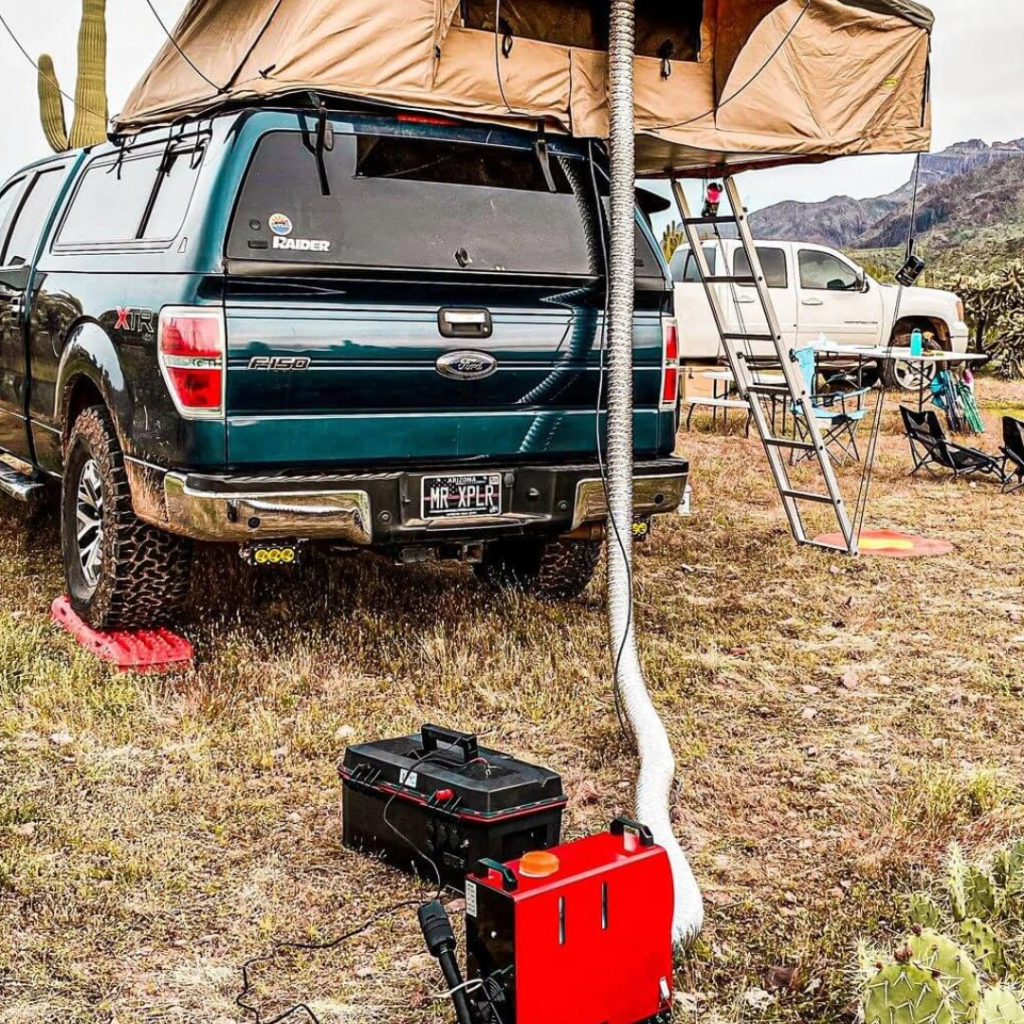Diesel heaters for campers are basically the cheat code for winter camping in Canada. Instead of burning through propane bottles or waking up to frozen boots, you get steady, dry heat that runs on a fuel you can actually carry, and in 2025, the portable units are way better (quieter fans, Bluetooth controls, safer exhausts) than the first wave everyone was importing in 2021–22.
What is a diesel heater for camping?
It’s a small 12V heater that burns diesel in a sealed chamber and blows warm air into your tent, truck canopy, camper, or RTT. Combustion happens outside the living space, so the warm air that comes in is dry; that’s the big win over propane, which adds moisture. That’s why overlanders and van guys switched to diesel: dry heat, low fuel use, runs all night.
Why it’s ideal for winter camping (2025 reality)
-
Dry heat → less condensation in RTTs and canopies.
-
Low draw → most 2 kW units sip power after startup; you can run them off a camper battery.
-
Fuel is easy → you can tap the truck tank or run a 5–10 L jerry.
-
Cold performance → good units are tested for northern winters, which matters if you’re camping in BC interior or Alberta ski lots.
The 2025 options (what’s on the market now)
-
Budget/Chinese all-in-one 5 kW–8 kW boxes — Amazon/Walmart, usually $150–$300 CAD, sometimes less. They work; tons of people run them, but quality is hit-or-miss, and you must install the exhaust properly. Good for truck bed, rooftop tent, ice fishing huts.
-
Mid/overland portables — Canadian overland shops selling boxed 2–8 kW heaters with Bluetooth, better ducting, nicer cases, $400–$650 CAD. These are built for RTTs, annex rooms, and truck campers.
-
Premium fixed installs (Webasto, Espar, Autoterm/Planar) — $1,400–$2,200+ CAD but bulletproof, parts available, quieter, better altitude compensation. This is what people use in Sprinters and expedition rigs.
-
New 2025 smart/portable releases — brands like BougeRV are pushing app-controlled 5 kW units with better safety and faster heat-up, meant exactly for RTT and truck camping users.
What to look for in 2025
1. Output (2 kW vs 5 kW vs 8 kW)
-
2 kW → small vans, RTTs, truck canopies.
-
4–5 kW → bigger campers, canvases, bad insulation.
-
8 kW → only if you’re heating a big tent or splitting outlets.
Note: a lot of “5 kW” heaters are just re-labelled; buy from someone who lists real output.
2. Real exhaust routing
Most problems people report online (CO, smell, moisture) are from bad installs or cheap silencers with holes. Exhaust must go outside, and you still run a CO detector. Non-negotiable.
3. Power draw & controls
Look for 12V, soft-start, and a controller you can actually read with gloves on. 2025 units with Bluetooth/app are nice if the heater sits outside the tent.
4. Noise
All diesel heaters click (fuel pump) and whoosh (fan). Premium units are quieter; cheap ones can be tamed with better mounts and pump silencers. If you camp in paid sites or with kids, it matters.
5. Service & parts in Canada
This is the part most people skip. If you’re buying for a whole BC winter, get something where you can buy a glow plug, controller, or pump locally, not wait 3 weeks. Canadian overland stores and marine shops usually stock Webasto/Espar parts.
Price points (Canada, 2025)
-
$150–$300 CAD → basic all-in-one Amazon/VEVOR style, 5 kW, loud, works if installed right.
-
$399–$650 CAD → nicer portable diesel heaters sold by Canadian overlanding shops (better cases, hoses, sometimes Bluetooth). This is the sweet spot for rooftop tents.
-
$1,400–$2,200+ CAD → Webasto / Espar / Autoterm/Planar proper kits, long-term rigs, ski-lot campers, or work trucks that can’t fail.
Why diesel beats propane for winter truck/RTT setups
Propane is fine for weekenders, but diesel wins when:
-
Temps are well below zero
-
You need dry heat for condensation
-
You want to keep the heater outside the tent/canopy
-
You want all-night runtime without lugging multiple bottles
That’s why 2025 truck-camping guides are pushing diesel first, then propane as backup.
Safety — don’t mess around
Every 2025 review still says the same thing: vent it outside, don’t sleep with exhaust under the truck, and run a CO detector. Cheap heaters are fine if you install them properly and replace sketchy exhaust parts. That’s the real risk, not the fuel itself.
TL;DR pick one
-
Weekend RTT / truck canopy → 2–5 kW portable diesel heater, outdoor box, duct into tent.
-
Van / long BC winter → Webasto/Espar/Autoterm hard-mounted.
-
Budget winter camping starter → Amazon 5 kW but buy a CO detector and upgrade exhaust.
-
Hunters / remote trips → higher-capacity 8 kW with big tank.
If you’re trying to figure out which diesel heater will actually keep a rooftop tent or truck canopy warm in a wet BC winter, that’s literally what we do. Here at RoofTopTents, we’re a Vancouver Island–based overlanding/camping shop: rooftop tents, awnings, bed racks, portable fridges, tow/recovery, and we’re testing diesel heaters to bring into the line this season. Call 1-250-740-1844 and tell us your truck/tent setup and temps, and we’ll tell you if you need 2 kW, 5 kW, or you should just go premium and be done with it.


